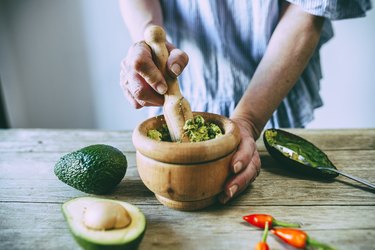
There is no definition of a "normal poop schedule" but there is what's normal for you and we'd gander that you like to keep your bowel movements fairly routine.
The frequency of your BMs can be considered "normal" if you're going three times a day or even three times a week, according to the Cleveland Clinic. Going more or less than this may mean you're experiencing diarrhea or constipation, respectively.
Video of the Day
Video of the Day
What's most important is keeping your number two schedule on track and these foods that make you poop might just help you achieve this.
1. Fruits and Vegetables
There are a number of reasons why eating enough fruits and veggies can help you poop. First, they're a good source of fiber. We know that's a no-brainer, but produce typically offers a good mix of soluble and insoluble fiber, both of which are needed for healthy poops.
Certain fruits such as pineapple, mango, papaya and figs contain digestive enzymes, which help your body better break down and digest the food you've eaten.
Papain, for instance, is found in papaya and it's been shown to help with digestive disorders like constipation, according to a 2013 study published in Neuro Endocrinology Letters.
2. Whole Grains
Whole grains like oats, rye, wheat and bulgur can help keep you regular and even remedy constipation. They're full of fiber and appear to benefit the good bacteria in our guts.
A March 2015 study in the Journal of Cancer Prevention found that a mixture of predominantly broccoli, chicory root and whole grains significantly improved constipation after just two weeks compared to the control group who ate rice flakes.
Other research suggests that rye bread works better than laxatives in relieving constipation and without all of the unwanted side effects, as outlined in a January 2010 study in The Journal of Nutrition.
3. Dietary Fats
All types of fat stimulate what's called the gastro-colic reflex, which helps your body prepare for food coming down your gullet by telling your large intestine to contract and move out food that's already in your gut.
High-fat foods, big meals and even drinking a large amount of a cold drink quickly can intensify this response, according to Monash University. You'll want to avoid fatty foods that have been fried or are high in saturated fat because they may have too great of a response, aka diarrhea.
Eating healthy sources of fat like olive oil, nut butter and avocados — especially in the a.m. when the reflex is at its strongest — may help you have a BM.
4. Probiotics
Yes, those good bacteria in your gut may help keep you regular. You can find probiotics in a variety of foods like yogurt, kefir, kimchi, kombucha and tempeh, and adding these foods to your diet helps to maintain a good balance of beneficial bugs in your microbiome.
A July 2019 study in the Turkish Journal of Gastroenterology found that in a small group of people with constipation, drinking kefir each day for four weeks increased stool frequency and consistency. Laxative use decreased as a result, too.
5. Prebiotics
Prebiotics are food for probiotics, which explains why they may help keep you regular. They're the non-digestible components found predominantly in fruits, vegetables and whole grains, according to the Academy of Nutrition and Dietetics.
Both probiotics and prebiotics work together to keep your gut in good working order.
6. Spicy Foods
We know spicy foods like hot peppers are good for us because they may aid in weight loss, heart health and managing blood sugars but they are beneficial for our guts too.
Capsaicin, the same compound linked to all of these health benefits, also triggers certain receptors in your gut, which causes it to get things moving, according to a June 2016 study published in Molecules.
Not everyone can take the heat, however, and we're not just talking about the fire you feel in your mouth. Spicy foods can also irritate the lining in the GI tract, especially if you have irritable bowel syndrome.
- Cleveland Clinic: "Frequent Bowel Movements"
- Neuro Endocrinology Letters: "Papaya preparation (Caricol®) in digestive disorders."
- he Journal of Nutrition: "Constipation Is Relieved More by Rye Bread Than Wheat Bread or Laxatives without Increased Adverse Gastrointestinal Effects"
- Monash University: "Eating and IBS Symptoms"
- Turkish Journal of Gastroenterology: "Effects of a Kefir Supplement on Symptoms, Colonic Transit, and Bowel Satisfaction Score in Patients with Chronic Constipation: A Pilot Study"
- Academy of Nutrition and Dietetics: "Prebiotics and Probiotics: Creating a Healthier You"
- Molecules: "Capsaicin, Nociception and Pain"
- Journal of Cancer Prevention: "A Controlled, Randomized, Double-blind Trial to Evaluate the Effect of Vegetables and Whole Grain Powder That Is Rich in Dietary Fibers on Bowel Functions and Defecation in Constipated Young Adults"